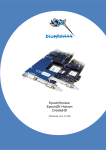Download Wiley Adobe Creative Suite 4 Bible
Transcript
TE RI AL Introducing the Creative Suite T TE D MA he Adobe Creative Suite 4 Design Premium package is composed of several programs designed to work together to accomplish all your publishing needs for output to print, screen viewing, and Web hosting. Instead of marketing the individual program components of the Creative Suite, Adobe Systems has spent much of its marketing effort targeting the entire Creative Suite to design professionals. RI GH This chapter offers a description of the Creative Suite programs and gives you an idea of how they work together. In this chapter, you learn about the purpose of each program and the relationship each program has with other members of the Creative Suite team. In addition, you receive a brief summary of new features contained in the latest releases of the individual programs. PY Why Creative Suite? CO Each program in the Creative Suite version 4 is an upgrade from the CS3 applications, and each is available for upgrades individually. So why is Adobe Systems spending so much marketing effort informing users about the benefits of the Creative Suite? And why talk about the Creative Suite as a single entity when users are likely to upgrade the individual software programs in their design studios? These may be the first questions on your mind as you see the advertising for Adobe imaging product upgrades. The answer is that Creative Suite is a single design solution where the whole is greater than its parts. For years, Adobe Systems built several different applications like Adobe Illustrator and Adobe InDesign with similar core technologies like PDF. These programs evolved with common elements so that you, the creative professional, could easily exchange files among Adobe programs. 3 IN THIS CHAPTER Understanding why Adobe developed the Creative Suite Knowing the Creative Suite applications Working with OpenType fonts Part I Getting Started with Workflow Solutions Rather than rely on a single program to perform tasks such as illustration, layout, and printing, Adobe offers you several applications, each a tool designed for a specific purpose to help you become more efficient in your creative process. These tools seamlessly integrate into the greater toolbox called Adobe Creative Suite. After working in individual programs, you can collect the creative elements together using Adobe Bridge and Adobe InDesign CS4 as the tool to perform layout assembly. You can then travel to output by exporting files to PDF documents in Adobe Acrobat, or you can host parts of your layout on a Web site using Adobe Dreamweaver CS4. Adobe Bridge is a separate executable application introduced in the Creative Suite version 2. Adobe Bridge is included when you purchase any of the CS4 standalone products but is not available for purchase as a separate product. For more information on Adobe Bridge, see the section “Adobe Bridge” later in this chapter. NOTE As standalone programs, Adobe Creative Suite 4 offers many new marvelous tools with enhanced features to create, design, and express your ideas. Collectively, these tools build upon the integration and interoperability introduced in the first version of the Creative Suite. Native file support The strongest argument for using Adobe Photoshop CS4, Adobe Illustrator CS4, Adobe InDesign CS4, and Adobe Flash CS4 together is that native file formats are easily transported among the various CS4 programs. You no longer need to decide about saving Photoshop files as TIFF, EPS, GIF, PNG, or JPEG. Rather, you can import a native Photoshop PSD or Illustrator AI file into Adobe InDesign CS4 complete with layers and transparency. You also can import native Illustrator and Photoshop files directly in Adobe Flash CS4 and Fireworks CS4. The native file format import feature alone can save space on your hard drive, because you need to save only a single file. Additionally, you save time in importing the correct file because only a single file is saved from the host application and used in your page layout. You also can directly open native Illustrator CS4 files in any Adobe Acrobat viewer, and you can open PDF documents in Illustrator and import them into InDesign. CROSS-REF For information on importing native file formats across programs, see Part III. Consistent user interface Programs that creative professionals use today are sophisticated and complicated. One of the major problems facing many designers is the large learning curve necessary to become productive in a computer program. When you use programs from several different software manufacturers, your learning curve increases. Application-software companies develop software according to standards each company sets forth in the design of the user interface. One company may make extensive use of contextsensitive menus, while another company may avoid them. One company may use palettes and panes liberally, while another company relies on menu commands and dialog boxes. Add to these differences the extended use of keyboard shortcuts; program differences require you to spend lots of time learning shortcuts. Additionally, the key sequence in one program may invoke a different command than the same key sequence in another program, and that can cause you lots of confusion. 4 Introducing the Creative Suite In workflow environments, consistency is crucial. Time is money, and the time required to train your staff cuts into your productivity and your profits. When tools are developed by a single software manufacturer, the result is a more consistent design of the user interface and the keyboard shortcuts that access menus, tools, and commands. Adobe has taken the user interface design one step further by offering customizable keyboard shortcuts and custom workspaces in all CS4 programs. Having a consistent look and feel in the user interface enables you to develop an intuitive sense for how to use a particular program to create a design project. The more you learn about a manufacturer’s products, the faster you can become productive. In some cases, you can jump into a new program, poke around, and understand many features without reading exhaustive manuals and books. CROSS-REF For information on customizing workspaces and keyboard shortcuts, see Chapter 3. Versioning tools How many times have you created a tight comp and had a client tell you that he or she likes another version of the layout? You may create duotone images in Photoshop, offer a proof print to your client, and hear that he wants another spot color in the Photoshop images. You offer a second proof, and the client says the first proof print is really the one that best fits his or her campaign. You’re back at your design studio scrambling through your hard drive looking for the first versions, locating the files, and importing or relinking them back into the layout. The Creative Suite lets you easily revisit earlier versions of illustrations, photo images, and layouts. Along with the standalone programs in the Creative Suite, you also receive Version Cue, a marvelous utility that permits you to save multiple versions of a design in the same file. You decide what version to promote to the current look, and the linked file in your InDesign CS4 document dynamically updates. In workflow environments, nothing more easily tracks the current version of a design and quickly gets you to final output with the correct version. CROSS-REF For more information on installing and using Version Cue and working with versions and alternates, see Chapter 7. Consistent color management Have you ever created an illustration, dropped it into a layout program, and seen a completely different color rendered in the layout? How about scanned images appearing with one color in Adobe Photoshop and different color values in the layout program? With the Adobe Creative Suite, you can access the same color engine and color-management policies among the design programs and Adobe Acrobat. In Creative Suite 4, you can manage color across all the print-oriented programs including Photoshop, Illustrator, InDesign, and Acrobat using Adobe Bridge. You assign color profiles in Photoshop, Illustrator, or InDesign, and these applications all can conform to the same color management settings. 5 1 Part I Getting Started with Workflow Solutions NOTE There is no support for color management or policies in Flash CS4, Dreamweaver CS4, Fireworks CS4, or Device Central CS4. CROSS-REF For more information on managing color across the Creative Suite programs, see Chapter 5. For more information on using Adobe Bridge, see Chapter 6. Dynamic object and image editing Ever have last-minute changes that you need to make before the last FedEx pickup of the day? A layout is complete, but you must quickly change an illustration or a photo image. In programs like Adobe InDesign CS4, a double-click of the mouse button or the selection of a menu command launches the editing program that created the object or image and opens the file in a document window. You make your edits and save the file, and the edited version is dynamically updated. This kind of quick editing saves a number of steps and streamlines your workflow. CROSS-REF For more information on dynamic object and image editing, see Chapter 24. Visual file exchanges Let’s face it; creative people are more visual and often work best in situations where they can first see a document before importing it into another program. More than ever before, Adobe has created a visually friendly workplace for you. You can easily drag and drop objects and images between document windows from one program to another, drag files from the desktop to open document windows, and copy and paste objects and images between documents. With Adobe Bridge, you can see all your files with thumbnail previews and drag and drop files into different application documents. You also can drag and drop Microsoft Word and Excel files into Adobe InDesign CS4 directly from the Bridge window. NOTE CROSS-REF For more information on importing and exchanging documents among programs, see Part III. For information on using Adobe Bridge, see Chapter 6. Support for PDF With InDesign CS4 as the central core of your Creative Suite programs for design purposes, PDF is the central file format for file exchanges and printing. All the Adobe CS4 programs, except for Flash and Dreamweaver, support PDF imports and exports, and these CS4 applications use the same Adobe PDF settings. In Creative Suite 4, PDF exports and imports are easier. InDesign CS4, as well as Photoshop CS4 and Illustrator CS4, supports exports to PDF/X format, which is a reliable document format used for commercial printing. Photoshop CS4 supports the creation of PDF slide shows; Illustrator CS4 and InDesign CS4 support PDF creation with Adobe PDF layers. InDesign CS4 now supports importing layered PDF documents and toggling layered views directly from within InDesign. You also can apply the same layer views to layered Photoshop and Illustrator CS4 documents. InDesign CS4 also supports multipage PDF file imports. Additionally, 6 Introducing the Creative Suite you can import media such as movie clips and sound files in InDesign CS4 and export them to PDF. Because PDF is the reliable standard for onscreen document viewing and output to professional printing devices, the CS4 programs take advantage of core PDF architecture. Finally, Fireworks CS4 can also author PDF. This allows a Web site to be shared and commented upon using standard Acrobat tools and techniques. CROSS-REF For more information on PDF/X and commercial printing, see Chapter 40. For more information on PDFs and multimedia, see Chapter 29. Understanding the Creative Suite The Adobe Creative Suite 4 comes in two design-oriented versions: n Adobe Creative Suite 4 Design Standard: This includes Adobe Photoshop CS4, Adobe Illustrator CS4, Adobe InDesign CS4, and Adobe Acrobat 9 Pro. n Adobe Creative Suite 4 Design Premium: This includes the same programs with the addition of Adobe Flash CS4 Professional, Fireworks CS4, and Adobe Dreamweaver CS4. Also, Adobe Photoshop CS4 is replaced with Adobe Photoshop CS4 Extended. Both design suites also include the common additional features of Adobe Bridge CS4, Adobe Version Cue CS4, and Device Central CS4. Adobe also has Creative Suite versions for Web and video professionals. For Web professionals, the suite options include: n Adobe Creative Suite 4 Web Standard: This includes Adobe Dreamweaver CS4, Adobe Flash CS4 Professional, Adobe Fireworks CS4, and Adobe Contribute CS4. n Adobe Creative Suite 4 Web Premium: This includes the same programs with the addition of several of the design packages including Adobe Photoshop CS4 Extended, Adobe Illustrator CS4, Soundbooth CS4, and Adobe Acrobat 9 Professional. Both Web design suites also include the common additional features of Adobe Bridge CS4, Adobe Version Cue CS4, and Device Central CS4. For video professionals, the available suite includes: n Adobe Creative Suite 4 Production Premium: This includes Adobe After Effects CS4 Professional, Adobe Premiere Pro CS4, Adobe Soundbooth CS4, and Adobe Encore CS4, along with the other design packages. The Adobe Creative Suite 4 Master Collection includes just about everything, except the kitchen sink. 7 1 Part I Getting Started with Workflow Solutions We cover all the programs found in the Design Premium version throughout this book, but although we get a little into Web development, we don’t cover the video products at all. In addition to the programs, you also get a large set of OpenType faces with the Creative Suite editions. Each of the programs is an upgrade from previous CS3 versions of the software along with the new version of Adobe Bridge, and Adobe Systems intends to upgrade the products in tandem for future versions. Therefore, you can be confident that the next upgrade of a program like Photoshop CS4 will appear along with upgrades to Illustrator CS4, InDesign CS4, and Dreamweaver CS4. Adobe Bridge Adobe Bridge, shown in Figure 1.1, is an updated executable application introduced in the Creative Suite version 2. With Adobe Bridge, you can view document thumbnail previews for all Adobe applications as well as many non-Adobe applications. CROSS-REF For information on using Adobe Bridge, see Chapter 6. FIGURE 1.1 The Adobe Bridge is the central navigation tool for all CS4 applications. 8 Introducing the Creative Suite You can use Adobe Bridge, which is your central navigation tool, to manage document assets and attributes. For example, using Adobe Bridge, you can assign common color management settings to all the print-oriented CS4 applications, as well as add metadata to all your documents and run keyword searches on that metadata. These features are available with Adobe Bridge: n Bridge Home: Adobe Bridge contains Bridge Home when used with the Creative Suite. The Bridge Home is the dashboard of the Creative Suite where you can view news feeds for each of the individual CS4 products, view your most recent activities, read about tips and techniques for using Adobe software, and much more. n Camera Raw: You can open and edit camera raw images from Adobe Bridge and save them in Photoshop CS4-compatible file formats. (Note that opening camera raw images in Adobe Bridge requires you to have Photoshop CS4 installed on your computer.) You can edit camera raw settings in Adobe Bridge before opening files in Adobe Photoshop CS4. n Color Management: Using Adobe Bridge, you can synchronize color management settings across the print-oriented applications to ensure consistent color in all your CS4 application documents. You can import and export color settings for sharing among service providers and workgroups. n File Browsing: As a file browser, Adobe Bridge is similar to the File Browser contained in earlier versions of Adobe Photoshop. Using Adobe Bridge as a file browser enables you to view thumbnail images of all Adobe application files and many other files created in other authoring programs. You can view page thumbnails from InDesign and Acrobat PDF documents. You also can view hidden files that your operating system uses on your computer. You can organize, sort files, create new folders, and move and delete files. You can edit metadata, rotate images, and run batch commands and automation scripts. n Launching Adobe Bridge: You can launch Adobe Bridge as a separate executable program. You also can launch Bridge directly from within Adobe Photoshop CS4, Adobe Illustrator CS4, Adobe InDesign CS4, Adobe Flash CS4 Professional, Fireworks CS4, and Adobe Dreamweaver CS4. NOTE Adobe Bridge CS4 includes an preference option to Start Bridge at Login that makes Bridge available when you start your computer. n Version Cue: In addition to launching all the CS4 applications from within Adobe Bridge, you also can access Adobe Version Cue CS4. You can create versions of documents, create alternates, apply document security, organize files into Version Cue private and shared project folders, and perform many other Version Cue-related tasks. Adobe Photoshop CS4 If you’re a creative professional, chances are good that you’re no stranger to Adobe Photoshop. Adobe’s flagship image-editing program is now in version 11 with the CS4 upgrade. As a standalone product, Photoshop has some very nice additions to an already feature-rich program. New enhancements to Photoshop add tools and options specific to interests by graphic designers, photographers, and Web designers. Adobe Photoshop CS4 offers you more integration with the other 9 1 Part I Getting Started with Workflow Solutions CS applications and some unique new editing tools. This version of Photoshop adds more polish to the program and enhancements that are likely to become favorites for creative professionals. These items are among some of the more impressive additions to the program you’ll find: CROSS-REF For information related to new 3D features in Adobe Photoshop, see Chapter 14. n 3D Object support: The new 3D features in Photoshop CS4 Extended let you load, view, rotate, and change the rendering method of 3D objects. Figure 1.2 shows the default soda can primitive. FIGURE 1.2 The 3D features let you work with 3D objects. n 3D Paint Mode: Once a 3D object is loaded, you can use the 3D Paint Mode to paint directly on the surface of the object, as shown in Figure 1.3. This is a huge timesaver for creating texture maps on 3D objects. n 3D Rotate and Orbit Tools: Within the Tools palette are two new tools for rotating and orbiting about 3D objects. These tools are non-modal and don’t require a confirmation dialog box before continuing. 10 Introducing the Creative Suite FIGURE 1.3 3D Paint Mode lets you paint directly on the surface of 3D objects. NOTE The 3D features are available only in Photoshop CS4 Extended. n Adjustment and Mask panels: The new Adjustment and Mask panels let you apply subtle tonal changes to images in a non-destructive manner. Adobe Illustrator CS4 Tried and true Adobe Illustrator is the premier illustration program for designers and artists. The advantages for using illustration programs together with other applications in the Creative Suite are significantly in favor of Adobe Illustrator. New impressive tools have been added to Illustrator as well as some polish on editing features. CROSS-REF For more information on using Adobe Illustrator CS4 and some of its new features, see Part III. 11 1 Part I Getting Started with Workflow Solutions You’ll also find these new features in Illustrator CS4: n Blob Brush tool: Illustrator’s new Blob Brush tool lets you paint pressure-sensitive paths that blend with one another to create a single object, as shown in Figure 1.4. The Blob brush detects color and only combines paths of like colors. FIGURE 1.4 The Blobby Brush tool lets you paint with random effects. n Appearance panel: The Appearance panel has been overhauled allowing more immediate editing of objects including apply stroke, fill, and effects. A Visibility icon for each appearance attribute makes it easy to turn attributes on and off. n Multiple Artboards: Illustrator now lets you work with multiple artboards. Adobe InDesign CS4 InDesign is the central hub of your creative workflow. This is where you bring together the images and objects that you create in Adobe Photoshop CS4 and Adobe Illustrator CS4. You can import type created in a word-processing program, import from Adobe’s InCopy, or set type in the InDesign Story Editor or in other ways. With InDesign’s free-form ease of page layout, you can lay out a design for publication. You can then export the InDesign document as a PDF file suited for print, Web hosting, electronic file exchanges, or CD/DVD-ROM replication. If you want to include 12 Introducing the Creative Suite your design as an HTML file for Web hosting, you can export the document for Dreamweaver CS4. As you can see, InDesign’s role among the Creative Suite programs is the anchor where files are imported to assemble a design and ultimately export for final output. Among the more significant new additions are these gems: n Export Options: The new export options allow InDesign documents to be moved to other formats. These options include a cleaner method for getting documents online using the XFL export feature. Another option exports to SWF for use in Flash. n Rotated Spread Views: Spread views can be rotated 90 degrees. n Smart Guides: These guides make it easier to align and orient objects in InDesign. n Preflight panel: The new Preflight panel, shown in Figure 1.5, makes it easy to prepare documents for printing and exporting. FIGURE 1.5 InDesign’s new Preflight panel checks for errors. Adobe Flash CS4 Professional Flash works with vectors much like Illustrator, but unlike Illustrator, Flash is key at creating animated and interactive elements that are common on the Web. It is great to see the inclusion of Flash into Creative Suite bringing with it the ability to add motion graphics to Web and online projects. Many of Flash’s tools work in a similar manner to Illustrator’s, and much work has been done to make the two products work well together. Files in Illustrator can be moved to Flash and back without losing any work. 13 1 Part I Getting Started with Workflow Solutions Although the entire package is new to Creative Suite, Flash CS4 Professional also includes a number of new features, including the following: n New Animation features: Flash CS4 includes a new approach for animating objects that makes it easier to work with. The new features include a set of motion presets. The new IK feature makes animating objects under the control of master bone objects possible. n 3D and Procedural Modeling: Flash includes support for 3D objects and a new procedural modeling ability. CROSS-REF For more information on using the new features in Flash CS4 Professional, look at Chapter 23. Adobe Dreamweaver CS4 Adobe Dreamweaver CS4 is a Web-authoring and site-management program. It has been tightly integrated with the CS4 applications and works well with them. CROSS-REF For more information on using the new features in Dreamweaver CS4, see Chapter 27. These are some of the new feature highlights: n Live View: Dreamweaver CS4 includes a new mode for viewing Web pages. Live View offers the ability to run scripts and preview content immediately within Dreamweaver. n Compatible Interface: The Dreamweaver CS4 interface has been overhauled and made to look like the other Adobe products, as shown in Figure 1.6. n Subversion support: Version control support using Subversion is now included in Dreamweaver CS4. In Chapter 27 of this book, we offer you a starting point for using Dreamweaver to create a Web site. In other chapters, we cover the integration of Dreamweaver with the other CS4 programs. However, our treatment of Dreamweaver is light, and you’ll need to acquire some other guides and publications in order to become proficient in using the program. CROSS-REF 14 Introducing the Creative Suite FIGURE 1.6 Adobe Dreamweaver CS4 uses the same palettes and interface design as the other CS applications. Adobe Fireworks CS4 Adobe Fireworks CS4 is an excellent package for creating, processing, and optimizing graphics for the Web. It is also very helpful in creating user interfaces. NOTE Fireworks is a new addition to Creative Suite CS4. Our coverage of Fireworks is limited. Adobe Acrobat Professional 9 Whereas Adobe InDesign CS4 is the hub of your creative satellite, PDF is at the center of the fileformat universe. All the print-oriented CS4 programs export and import PDF documents, and the expansion for PDF support is found in the new product upgrades. For design workflows, Adobe 15 1 Part I Getting Started with Workflow Solutions Acrobat Professional in version 9 offers you many tools to facilitate collaboration with colleagues, clients, and prepress technicians. You can do these things: n Set up e-mail–based reviews for markup and approval of design concepts and proofs n Enable PDF documents with special usage rights so users of the free Adobe Reader program can participate in comment and review sessions n Export comments and corrections directly to Microsoft Word text documents (on Windows XP with Office XP only) n PDF Portfolios n Prepare files for digital prepress and printing including the ability to convert composite black to K-only output n Authenticate and secure documents n Develop media shows and slide presentations for kiosks, meetings, and presentations n Review sessions and forms hosted by Acrobat.com n Organize your design environment and catalog design campaigns embedding native files in PDFs for an organized storage system n Search for content contained on CDs, DVDs, network servers, and Web sites All in all, Acrobat 9 Pro has a significant place in your design workflow. Acrobat 9 Pro was released several months earlier than the other CS4 programs and is not on the same development cycle as the other CS4 programs. Part of the reason for the early release of Acrobat was the necessity to develop the PDF specifications used by all the other CS4 programs. Adobe Acrobat is unlike the other CS4 programs in that the application is designed to serve many different office professionals. Acrobat might be used by engineers, legal professionals, business office workers, government workers, school districts, and just about anyone in any industry working on a computer today. Therefore, there are a number of tools that you, as a creative professional, may not use in Acrobat just because those tools may not serve your needs. Adobe Drive and Version Cue You’ll find the new enhancements to Version Cue another step toward complete integration of the Adobe CS4 applications. Together with Adobe Bridge, this release of the Creative Suite helps you easily manage documents and revisions. Adobe Version Cue is now in version CS4 like the other CS applications. Adobe Drive provides a way to connect to external servers and share files. 16 Introducing the Creative Suite Device Central CS4 Another helpful component installed as part of the suite is Device Central CS4. This application is a lifesaver if you need to configure your pages to be displayed on mobile devices such as next-generation phones. Device Central includes a broad collection of mobile devices that are emulated so you can view exactly how your pages will look on various devices. OpenType fonts In addition to the programs contained in the Creative Suite, you also can find a large set of installed OpenType fonts after completing your CS4 applications installation. OpenType fonts are based on font technology developed by Adobe Systems and Microsoft. OpenType fonts offer you new typehandling features among many of the CS4 applications. You should convert your type library to OpenType fonts as soon as possible. You’ll derive these benefits from using OpenType fonts: n Cross-platform support: OpenType fonts are completely cross-platform. You can copy the same font to either Mac OS or Windows. Obviously, licensing restrictions do apply, so be certain to check these restrictions before installing fonts on multiple computers. n Reliability: If you experience font problems when you print, be certain to first reevaluate your font sets. Off-brand fonts, especially many TrueType fonts, can create embedding problems. Furthermore, some quality fonts carry licensing restrictions that prevent font embedding. If you create PDF files with font embedding, be certain to review the licensing restrictions on your fonts and check whether font embedding is prohibited. Many quality fonts offer you complete embedding permissions that help prevent problems when it comes time to print your creations. Good-quality fonts that permit font embedding include those found in the Adobe type library of OpenType fonts. n More glyphs: A glyph is an individual font character. TrueType fonts and all earlier PostScript fonts contain a maximum 256 glyphs. The new OpenType fonts can contain more than 65,000 glyphs. These additional characters offer you many special characters, precisely proportioned fractions, and foreign-language character alternatives. A portion of a glyph set for an OpenType font installed with the Creative Suite is shown in Figure 1.7. n Multi-language support: All the OpenType Pro fonts contain characters needed for multiple-language typesetting. OpenType fonts are available in Pro and Standard families. The OpenType Pro families provide a certain type of characters, but OpenType Standard families use the OpenType technology and don’t have a broad set of glyphs. NOTE n Easier font management: OpenType fonts contain only a single file for font viewing onscreen and fonts used for printing. Unlike PostScript fonts containing separate files for screen views and each face in a font set contained in a separate file, OpenType fonts are built in a single file, thereby providing you more ease in keeping track of fonts, installing them, and locating them. 17 1 Part I Getting Started with Workflow Solutions FIGURE 1.7 OpenType fonts offer you more than 65,000 characters. Several CS4 applications support a Glyphs palette where you can view an entire font in a scrollable window. You can insert a character at the insertion point by double-clicking a glyph in the palette. You no longer need to open a utility to view all characters in a given font set when you use programs like Adobe InDesign CS4 and Adobe Illustrator CS4. Summary n The Creative Suite is a collection of applications offering professional designers complete integration for print, Web design, and screen viewing. n Programs from a single software vendor provide consistent user interfaces and similar menu and tool functions, which reduce learning curves for new hires. n Adobe Bridge is a central navigation tool offering features for viewing, editing, and managing Adobe CS4 application documents and non-Adobe files. 18

























